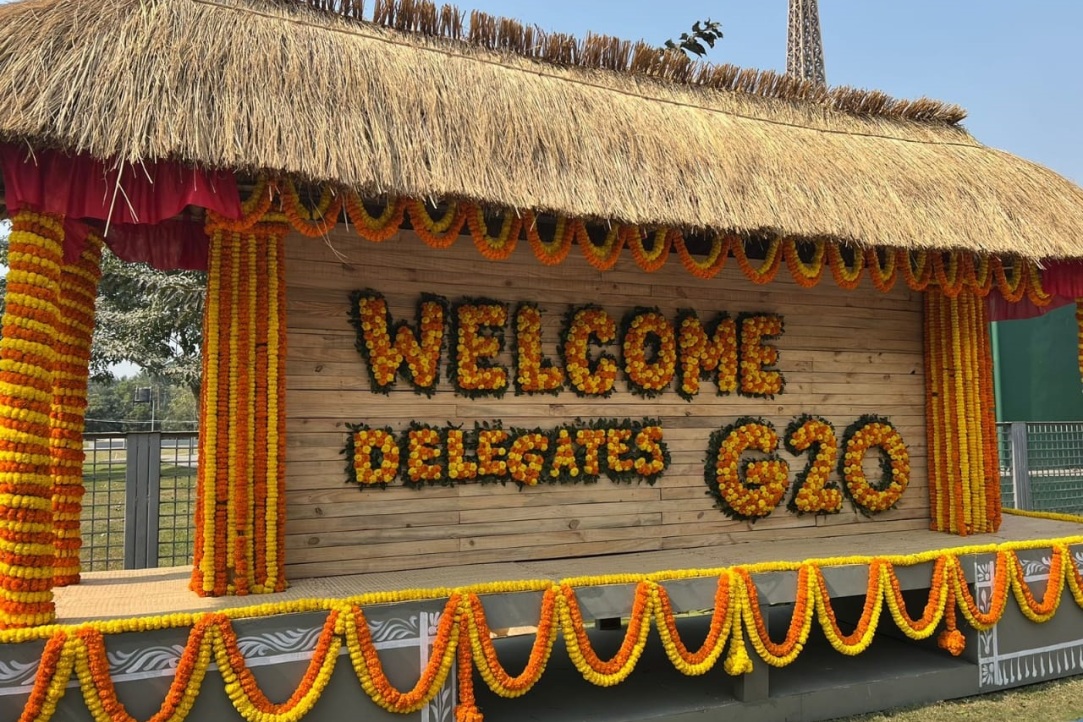How Carbon Farming Promotes Bioenergy with Carbon Capture and Storage

As part of its G20 Presidency, India is hosting the Research and Innovation Initiative Gathering (RIIG). Alexey Ivanov, Director of the International BRICS Competition Law and Policy Centre and Academic Supervisor of the HSE Technology Transfer Centre, represented Russia at the RIIG kick-off meeting. The Russian delegation also included representatives of the Russian Ministry of Science and Higher Education and a number of research institutes.
RIIG proposes creating a G20 working group on research, innovation and equity that would unite leading economic powers to address these issues.
The event was held in Kolkata on 8–9 February.

Alexey Ivanov emphasised the importance of achieving the climate goals set out in the Paris Agreement. These goals cannot be achieved without the development of technologies to absorb carbon dioxide from the atmosphere. One of the most effective solutions is the biological sequestration of carbon using natural systems, said Alexey Ivanov. If implemented correctly, biological solutions can provide significant benefits. Natural solutions—a subset of biological methods of carbon capture and storage based on ecosystem conservation—can help restore and conserve biodiversity, mitigate soil degradation, and reduce the impact of floods and droughts while bringing other benefits to ecosystems.
In addition, broader biological solutions such as planting trees and other plants with high absorption potential will produce considerable biomass that can be used in a bioeconomy, placing more emphasis on 3R (reduce, reuse, recycle) processes. ‘In this way, biological sequestration and bioeconomics can enter into a positive feedback loop, where the development of one leads to the further development of the other,’ stressed Alexey Ivanov.

In this context, carbon-farming programmes which encourage farmers to adopt carbon sequestration methods are gaining momentum around the world. In India, a project launched in the state of Maharashtra rewards farmers growing rice and cover crop for adopting no-till farming practices that improve soil health. Payments come from private enterprises that want to make up for their carbon footprint and create a climate-friendly image.
Russia and Kazakhstan have great potential for carbon farming. Huge territories withdrawn from agricultural production (tens of millions of hectares) and favourable climate conditions allow these regions to become a rich resource base for a carbon economy (an industry with negative emissions) and, consequently, for bioeconomics, said Alexey Ivanov. This was the subject of ‘Fighting Climate Change in Eurasia: Carbon Exchanges and Prospects of Carbon Farming’, an international conference held by the International BRICS Competition Law and Policy Centre and its partners during Astana International Investor Week in October last year.
At the same time, it is crucial that the low-carbon potential of these abandoned lands be used for the environmental and economic benefit of the countries they are located in, thus contributing to the overall climate goals set out in the Paris Agreement, said Alexey Ivanov at the RIIG kick-off meeting.
The Russian Ministry of Science and Higher Education has been testing technologies to monitor greenhouse gas fluxes in a number of Russia's terrestrial and marine ecosystems, including inland waters, since February 2021. The aim of the project is to obtain objective data to assess the potential for carbon sequestration. As part of this project, HSE University operates the Pokrovsky agricultural carbon test site located in the Moscow, Kaluga and Kirov regions.
In 2021, HSE University released the report 'Battle for the Climate: Carbon Farming as a Stake for Russia’. The report analyses the potential of the emerging carbon agriculture industry in the Russian agricultural and forestry sectors.
See also:
Experts from HSE University Explore Prospects for Carbon Farming in Kazakhstan
HSE University’s International BRICS Competition Law and Policy Centre and the university’s Centre for Technology Transfer, together with the International Institute for Applied Systems Analysis (IIASA, Vienna), have released a draft version of the research report ‘The Carbon Farming Industry in Kazakhstan: Unlocking Opportunities.’ Experts from the UN Convention to Combat Desertification and the Kazakhstan-based TALAP Centre for Applied Research also took part in the project.
Carbon Farming and Bioeconomy Development in Russia: Presentation of HSE University Carbon Test Site at G20
The G20 Research and Innovation Initiative Gathering (RIIG) on circular bioeconomy was recently held in Dibrugarh, India. Over a hundred scientists, representatives of government agencies, and members of international organisations from almost thirty countries (including Russia) took part. Alexey Ivanov, Academic Supervisor of the Centre for Technology Transfer at HSE University, spoke about the role of carbon farming in climate change mitigation and bioeconomy development and presented a project of the Pokrovsky carbon test site operated by HSE University.
HSE University to Launch New Carbon Test Site
A new HSE-operated carbon project—the Pokrovsky agricultural carbon test site—will soon be launched in the Moscow, Kaluga and Kirov regions. Its main purpose is to monitor greenhouse gas flows in the respective ecosystems to assess their carbon balance. The project is expected to produce the first Russian prototype of a comprehensive monitoring framework for ecosystems in agroforestry-based carbon farming.


